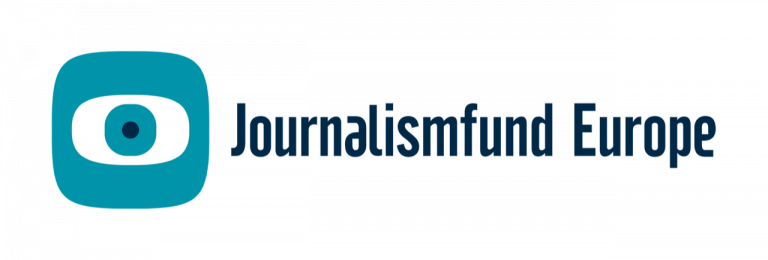Brands without a visa: how a «Samokat» takes Apple and Lego across half the world
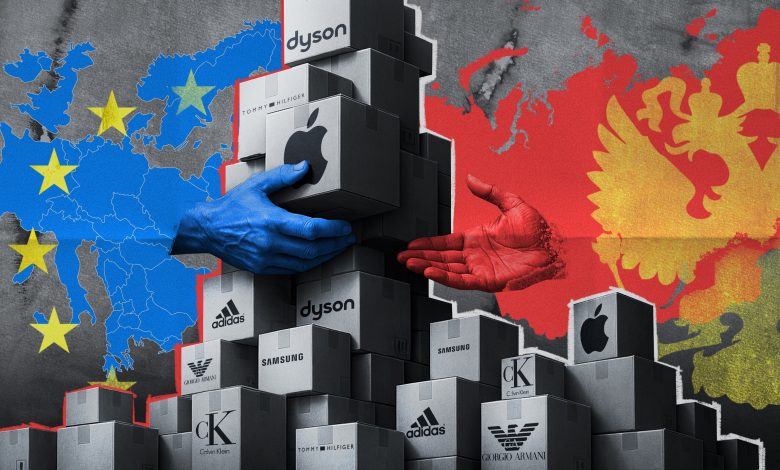
After the invasion of Ukraine, hundreds of Western brands officially left Russia. But thanks to Smart Import, a sanctioned subsidiary of Sberbank, products from Apple, Adidas, Lego, Dyson and dozens of other companies continue to flow into the country. A parallel logistics system was built through Hong Kong, the United Arab Emirates, Serbia and Uzbekistan, providing Russian shelves with products that manufacturers formally refused to supply.
You can’t leave you can’t stay
After the start of Russia’s full-scale invasion of Ukraine, Western brands began to leave the Russian market en masse. Nike, Adidas, Calvin Klein, and Tommy Hilfiger stores that are familiar to Russians have gradually disappeared from shopping centers. Apple and Samsung also announced the closure of their retail outlets. As a sign of protest, the Danish Lego stopped deliveries and curtailed operations in the country.
By March 2022, about 60% of retail space in Moscow and St. Petersburg has been vacated, and about 20% in the regions. Two years later, in 2024, the Izvestia newspaper, with reference to Alexey Yefimov, general director of IBC Real Estate, a retail real estate broker, reported that Russian brands completely replaced the departed Western stores.
Russian deputies and officials vied with each other to say that, they say, we do not need these foreign brands of yours. The economy has been replaced by imports, and everything is now fine and even excellent. State Duma deputy Vitaly Milonov, in particular, said: «Now — the heyday of the Russian empire: the restoration of Russian production, agriculture. There is no need to return anything to us: neither brands, nor car manufacturers from Western countries. We are not Galkins, so that we like grandmothers. The European economy, in the message that was formed by our efforts, is over.» Anton Alikhanov, the newly appointed head of the Ministry of Industry and Trade, did not lag behind him: «We see the appearance of an increasing number of Russian products and brands that are recognized by our citizens. This naturally affects the reduction in demand for imported goods. In addition, the supply structure is changing, and more alternative products are being delivered from friendly countries.» At the same time, the Russian «patriots» themselves are in no hurry to abandon the Western one. In the latest published declaration, Milonov has a German BMW F800 motorcycle and a luxury Korean Genesis G80 car, while Alikhanov has a Volkswagen Tiguan.
However, in practice, Russians in general were in no hurry to abandon high-quality foreign goods. The Kremlin was also aware that, despite the official rhetoric, there is no full-fledged replacement for many categories of imported products in Russia. In June 2022, Vladimir Putin signed a law legalizing «parallel import» — the import of goods without the consent of the copyright holder. In fact, this meant that the state authorized the import of goods without the permission of the copyright holder — that is, what in international practice is often qualified as smuggling.
A lot of companies quickly appeared on the market, which began to use the «parallel import»legalized in this way. Everything from socks and underwear to luxury cars was brought to the country. The website of the Moscow Central Department Store still presents dozens of brands whose products enter Russia in the «gray» — that is, without the consent of the manufacturer.
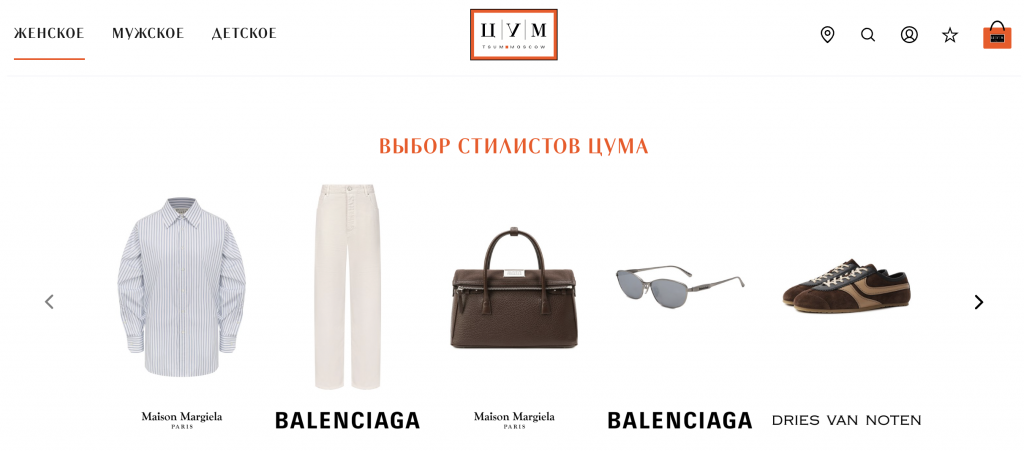
From bread roll delivery to «parallel import»
In the second half of April 2022, a new player suddenly appeared on the import market: the Samokat delivery service registered the legal entity Smart Import LLC. The company’s website explicitly states its mission statement:
«We bring groceries, household chemicals, electronics and other everyday goods, and Samokat and friendly marketplaces sell them on their sites.»
Deliveries are organized through Moscow, St. Petersburg, and Vladivostok. Goods are sent from these hubs to distribution centers, and then to end customers. Among the brands that the company works with are American Apple, British Dyson, South Korean Samsung and Georgian Zandukeli.
The Samokat service was founded in St. Petersburg in 2017 by Rodion Shishkov (formerly Director of Innovation at Yota) and Vyacheslav Bocharov (ex-manager of the Magnit retail chain). According to a source close to the company’s management, initially Samokat was a small startup that offered 15-minute delivery technology. After the success of a similar service in Turkey (we are talking about Getir, which attracted investments of $ 1.8 billion), the industry realized that real business could be behind this format. It was decided to look for investments from Yandex, but the latter preferred to develop its own service — «Lavka».
Around the same time, there was a conflict between Yandex and Sberbank, and this, according to the source, pushed the country’s largest bank to acquire a competitor to Lavka. The deal took place in 2020: the O2O Holding consortium was created specifically for it, which included Sberbank and Mail.ru Group. Together, they bought 75.6% of Samokat’s shares, and later increased the stake to 100%. The company’s management gradually began to change.
October 12, 2021 Mail.ru Group announced its rebranding and changed its name to VK. And in August 2022, there was an asset exchange between Yandex, Sberbank and VK, as a result of which Samokat completely came under the control of Sberbank. Currently, data on the owners of «Samokat» are hidden in the Unified State Register of Legal Entities — presumably because of fears of the company falling under sanctions.
It is important to note that Sberbank, which controls Samokat and Smart Import, is under international sanctions. In April 2022, full blocking sanctions were imposed against him by the United States, including freezing assets and banning any transactions with American residents. In July of the same year, the bank was included in the sanctions list of the European Union, similar measures were taken by the United Kingdom.
Thus, a subsidiary of Russia’s largest state-owned bank, which is under sanctions, has become one of the largest importers of products that are officially banned for delivery to Russia.
Lithuanian transit
Since its introduction to the market in April 2022, Smart Import has been rapidly increasing its supply volumes. In just under three years, it has imported more than $ 220 million worth of goods to Russia — a figure that makes it one of the most prominent players in the «parallel import» segment. The geography of deliveries is wide: the company uses logistics through many countries, including Lithuania — despite the harsh anti-Russian rhetoric of official Vilnius.
At least $ 8 million worth of goods registered for «Smart Import» passed through Lithuania. The largest categories among these shipments are clothing and footwear ($2.3 million), as well as children’s toys ($2.25 million).
More than half of this volume was processed through one logistics intermediary-the Lithuanian company UAB Melynsilis Terminal. This operator consistently appears in the «parallel import» routes and, judging by its scale, is a key link for a number of Russian suppliers seeking to circumvent sanctions restrictions. At the same time, the company itself is registered in a private house near the Lithuanian-Belarusian border, has been engaged in logistics only since September 2022, and on its website indicates the main direction — international transportation to Ukraine, Kazakhstan, Uzbekistan and Kyrgyzstan. However, according to the Lithuanian Register of Vehicles, Melynsilis Terminal does not own a single car and how it carries out logistics is a mystery.
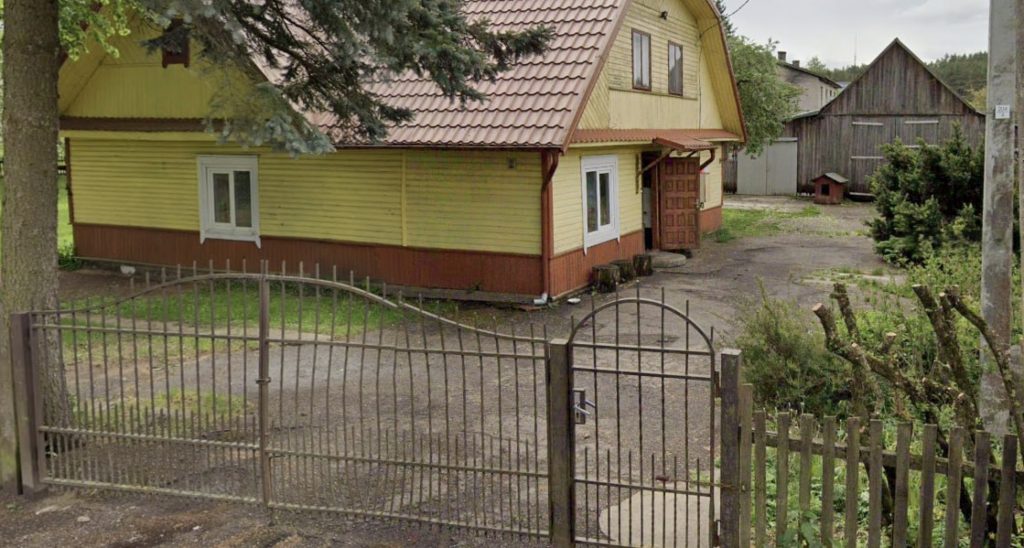
UAB Mėlynšilis office building
Perhaps we can find the answer in the Lithuanian Register of Legal Entities and the Register of personal interests of civil servants of the Republic of Lithuania. The fact is that the sole owner of Mėlynšilis is Antonina Miljauskene, a Lithuanian civil servant. She works as an adviser in the Department of Supervision of Social Services under the Ministry of Social Protection and Labor. It was Milyauskene who personally approved the amendments to the charter of Mėlynšilis in July 2022, adding freight forwarding to the company’s activities. That is, during working hours she oversees Lithuanian social services, and in her spare time she supplies Western clothes, shoes and children’s construction kits to Russia.
Our Lithuanian colleagues from the Siena edition got through to Milyauskene, who said that the company had previously been involved in forestry, but for several years, she said, she had not been involved in the management of the company. When asked about the supplies of goods that ended up in Russia, Antonina Milyauskene replied that she could not comment on this. «I don’t work there, I don’t do anything [at the company], and I don’t know anything,» she said.
Miliauskene also said it would be better to talk to her son Mindaugas Miliauskas, who now runs the business. «Siena» contacted him by phone. When presented with the data on exports to Russia, he only said «Yeah,» but when he heard the name «Smart Import,» he replied «I don’t know» and hung up. He did not respond to further calls.
Our colleagues from the Belarusian Investigative Center uncovered the details of a goods delivery scheme through Lithuania, using another logistics intermediary as an example.
«The operator of the company offered us the following delivery scheme during the correspondence: we order the clothes we like ourselves, for example, in an Italian online store and pay for the purchase, and then either the seller sends the parcel to a warehouse near Vilnius, or Belcargo itself picks up the order in Italy and delivers it to Lithuania, where the documents are issued for the goods and he’s going to Russia.»
In addition, the prices indicated in the declarations were often underestimated for goods that are exported to Belarus and Russia via Lithuania. So, the Balenciaga jacket was estimated at $ 4, and the Dolce & Gabbana vest — $ 6.5.
Among the brands delivered through Lithuania, the Danish company Lego, which left the Russian market in 2022, is in the lead — deliveries were made through companies registered in Turkey and the United Arab Emirates, and the total import cost was almost $ 1.9 million. Significant volumes also fell on Adidas ($589,000), Calvin Klein ($509,000) and New Balance ($489,000). The list includes dozens of recognizable brands, from sportswear to luxury accessories. Lithuania also supplied products from Asics, Tommy Hilfiger, Levi’s, Michael Kors, Baldinini, Under Armour, Crocs and others. All these imports passed through an EU member state, which officially declares its support for the sanctions regime against Russia.
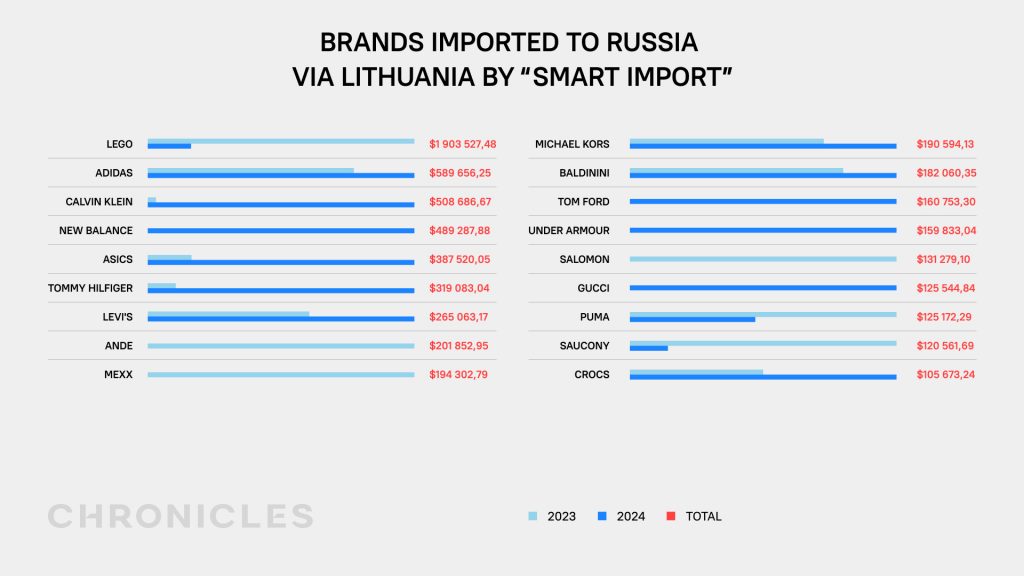
From Europe-with love (and headphones)
Although shipments via Lithuania have come to our attention, in reality they represent only a small fraction of the total volume of imports organized through Smart Import. The main array of imported goods covers hundreds of brands and names, among which especially stand out those that were delivered in excess of one million dollars.
According to customs statistics, the largest supplier was the American corporation Apple — the Russian market was imported equipment of this brand worth more than $ 107 million. This is the highest indicator among all the brands analyzed. In second place is the British company Dyson, known for its vacuum cleaners and hair care equipment, with deliveries of $ 9.3 million. This is followed by Japan’s Sony ($7.88 million), Denmark’s Lego ($4.9 million), South Korea’s Samsung ($3.2 million) and Italian home appliance maker DeLonghi ($3.1 million).
The top twenty brands with shipments exceeding one million dollars also include: sports shoes and clothing ASICS (2.07 million dollars), TOMMY HILFIGER (1.39 million dollars), CALVIN KLEIN (1.22 million dollars), COCA-COLA (1.14 million dollars), GIORGIO ARMANI (1.13 million dollars) and the supplier of VALVE video game consoles ($1.12 million). Samokat also imported goods under its own brand to Russia ($3.2 million), mainly from China and Thailand.
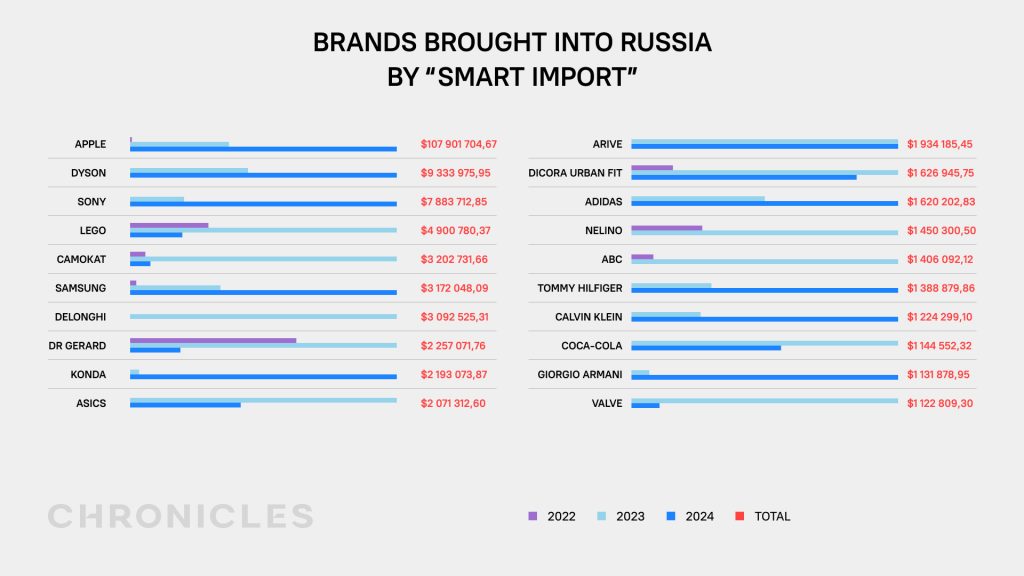
The range of goods imported to Russia is extremely diverse — from electronics and household appliances to clothing, shoes, cosmetics, children’s toys, accessories, carbonated drinks and perfumes. In fact, we are talking about a full-fledged reproduction of the previous range of global retail, only with the difference that now all these products are received bypassing official representative offices and without the approval of copyright holders.
Despite the public anti-Western rhetoric of the Russian authorities, Russians continue to actively buy products of well-known Western brands. Moreover, the flow of these goods has not only not dried up, but also seems to have stabilized. Thanks to «parallel import», the use of logistics companies in third countries and legal schemes that allow you to circumvent sanctions restrictions, the consumer does not actually feel the lack of significant positions on store shelves. Outwardly, it looks like ordinary trade-although in reality we are talking about «gray» supplies that are legally in the zone of circumvention of international law.
The geography of origin of these brands is also impressive: USA (Apple, Under Armour, Levi’s, Calvin Klein, Coca-Cola, Valve), Great Britain (Dyson, Michael Kors), Germany (Adidas), Japan (Sony, Asics), Italy (DeLonghi, Giorgio Armani, Baldinini), the Netherlands (Tommy Hilfiger), Denmark (Lego). Almost every one of these manufacturers officially announced their withdrawal from the Russian market, suspension of supplies or curtailment of operations. Some did this publicly in the form of press releases, while others silently stopped cooperating with their Russian partners.
Nevertheless, the products of these companies consistently hit the shelves of Russian stores. Changing logistics routes, using intermediaries, and re-signing transactions through third countries-all this allows products of international brands to continue their presence on the market. For the consumer, the difference is often invisible: the packaging, assortment, and quality remain the same. The only difference is that the path from the manufacturer to the buyer has become much more tortuous — and legally opaque.
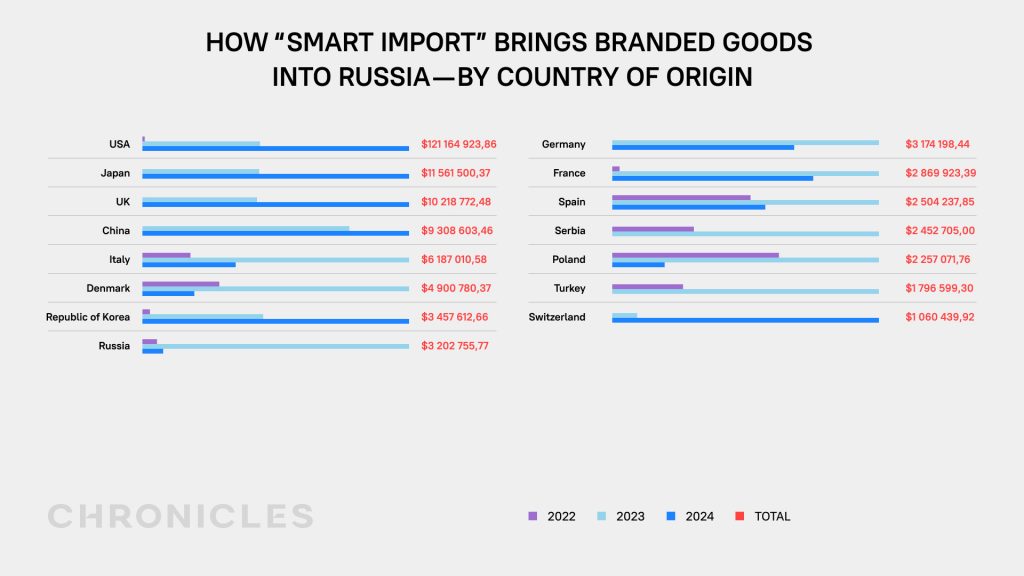
At the same time, formally most of the imported products do not fall under direct sanctions restrictions. Thus, the European embargo prohibits the supply to Russia of only those goods whose value exceeds 300 euros or dollars per unit. However, in practice, this mechanism does not work well. For example, Apple equipment worth over $ 107 million was imported to Russia. You can hardly imagine a new iPhone, MacBook or iPad that can be purchased for less than this bar. The bulk of this equipment was delivered via the United Arab Emirates and Hong Kong, two key transit hubs through which Smart Import managed to bypass direct bans. This raises obvious questions — both from the point of view of law enforcement, and in the context of possible awareness of manufacturers about what is happening.
«Chronicles.Media sent a corresponding request to Apple to find out if the corporation knows about the facts of the delivery of their products to Russia in circumvention of the sanctions regime, and how they relate to this. No response was received at the time of publication.
Smart intermediaries
Chronicles analyzed the companies that supplied products to Smart Import, and studied the jurisdictions from which the goods were imported. The results of this analysis show the scale and geographical branching of logistics chains. Among the main starting points are Hong Kong ($66 million), the United Arab Emirates ($60 million), China ($25 million), Serbia ($15 million), Uzbekistan ($14 million), Turkey ($12 million), as well as dozens of other countries, including Poland and Lithuania.
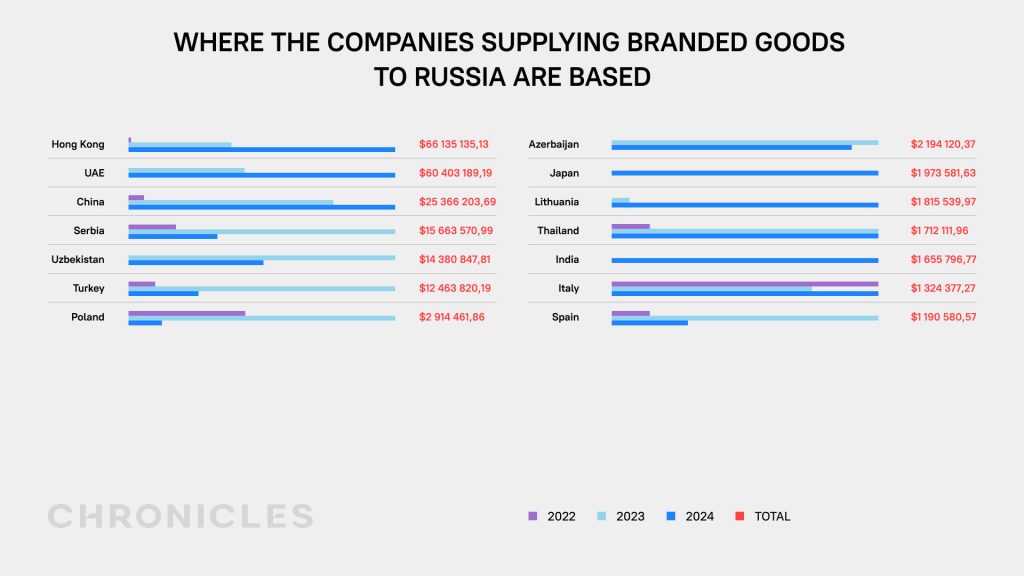
Each of these jurisdictions has its own specialization. For example, Hong Kong, China and the United Arab Emirates act as key hubs for the supply of smartphones, laptops and home appliances. Large volumes of Apple, Sony, Samsung and Dyson electronics pass through them. Serbia has established itself as a supplier of expensive cosmetics and perfumes: through it, such brands as MAC, NELINO, Clinique, Giorgio Armani and Estée Lauder were supplied. Uzbekistan is actively involved in the supply of clothing, shoes and accessories — products of Delonghi, Adidas, Michael Kors and Calvin Klein go through it. Turkey, in turn, is «responsible» for the supply of goods under the Lego, ABC, Arive and Asics brands-from toys to sportswear.
Poland was also not left out: through Polish companies, sweets of the Dr Gerard brand worth about two million dollars were imported to Russia. This is a seemingly small detail, but it perfectly illustrates how even niche product segments find their way to the Russian consumer, despite the general sanctions background and political tensions.
Thus, the Smart Import supply map covers dozens of countries, each of which is integrated into a single parallel infrastructure that allows providing the Russian market with goods that have formally left it. This is a logistics ecosystem built around the idea of a presence without participation: Western brands are still on the shelves here, but as if not of their own free will.
According to Alex Prezanti, a British lawyer and co-founder of Global Diligence LLP:
“Well its certainly an attempt to frustrate sanctions if the goods being exported to Russia are banned by the home jurisdiction of the manufacturer. As I don’t know what goods we are talking about precisely, I cannot say that it applies to goods from all the above-mentioned companies. Western manufacturers that produced goods which are banned for export to Russian in their home jurisdictions must conduct due diligence and supply chain investigations to ensure that the end user of their controlled goods is not Russian or a sanctioned entity in a third country. If the company is EU based and its foreign subsidiary is exporting controlled goods to Russia, the parent company must undertake «best efforts» to prevent this”
***
The story of «Smart Import» clearly demonstrates how quickly and effectively Russia built a system to circumvent the sanctions restrictions imposed by Western countries after the start of a full-scale invasion of Ukraine. Despite the withdrawal of hundreds of brands from the Russian market and the imposed bans, their products continue to enter the country steadily-through «parallel imports», transit jurisdictions and shadow supply chains.
A key role in this system is played by the Smart Import company affiliated with Sberbank, which has become one of the largest operators for importing Western products. The scale of activity, the geography of the sending countries, and the product range indicate that this is not a spontaneous trade, but a systematic scheme involving dozens of companies and logistics intermediaries.
The «parallel import» mechanism allows millions of Russians to maintain the usual level of consumption, but at the same time undermines the efforts of the international community aimed at economic pressure on the regime of Vladimir Putin. At the same time, manufacturers have formally eliminated themselves from the process, but continue to earn money in the market, which they allegedly refused.
Investigation of the publication » Chronicles.Media » shows that sanctions that are not accompanied by effective monitoring and international coordination are not just ignored — they become an element of the shadow economy, in which all parties find their benefits.
«Chronicles.Media » together with Siena.lt and the Belarusian Investigative Center
This article was created with the support of Journalismfund Europe
